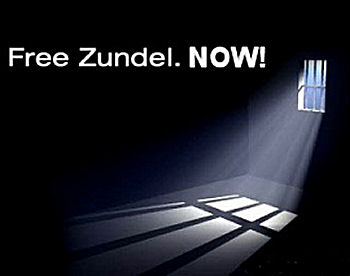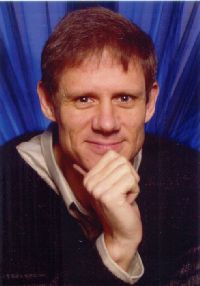| Breaking news from freedom's front line
The Trial of Germar Rudolf in Mannheim District Court
Day 7, 22 January 2007
Reported by Günter Deckert
Translated by J. M. Damon
Today the security procedures began earlier and were handled more skillfully and casually than heretofore. I counted only seven policemen in the building. The trial session, scheduled for 9 o’clock, began at 9:08.
Present in the courtroom were:
1) The usual members of the Court, Judge Schwab presiding;
2) District Attorney Grossmann;
3) The two lawyers for the defense, Stolz and Bock;
4) four Stachu (Staatschutz) or state police agent, including two new faces; one bailiff and two uniformed policemen, all armed;
5) “Establishment” Media: Once again, incredibly, none present!
6) Visitors: Initially 32, with others coming later. These included Dr. Rolf Kosiek of Grabert Publishing House and F. Duswald of Linz, Austria with colleagues from the liberal–patriotic magazine Aula, which is published in Graz. Other visitors came from a considerable distance, including Berlin, the Rheinland and Switzerland.
Judge Schwab opened the proceedings and asked the members of the Court whether they had read the Internet printouts dated 29 June 2004 and 2 July 2004, as well as the verdict of the Stuttgart District Attorney. Germar Rudolf had not received the printouts. The two lay judges said that they had now read Germar’s Lectures on the Holocaust in its entirety, except for those portions not written in German. Their affirmations were entered into the record by the court historian.
Germar began by discussing at length the book by scientist and philosopher Karl Popper (1902–1994), Objective Knowledge: An Evolutionary Approach, dealing with science and the scientific method. Popper is best known for repudiating the classical observationalist method. He advanced the principle of “empirical falsifiability” as the correct criterion for distinguishing between valid and invalid science. He was a vigorous defender of liberal democracy and the principles of social criticism that make it possible for the open society to flourish.
At 9:15 Germar requested a brief pause in order to confer with his lawyers. Proceedings resumed at 9:51 and German announced the final part of his presentation. He began this final part by explaining his philosophy as a publisher, quoting Voltaire’s famous dictum "Sir, I disagree with every word you say, but I will defend to the death your right to say it." This dictum is central to the European concept of civilized discourse. Germar explained that all his life he has been fundamentally opposed to every sort of censorship. He said that for the sake of balanced discourse he has often published materials with which he personally disagreed.
He then quoted former President of the Federal Republic, Prof. R. Herzog, CDU. On the occasion of an award by German Book Dealers, he stated: “No one must suffer consequences for expressing his opinion.” Germar pointed out that such utterances on festive occasions are purest hypocrisy since in Germany, this presumed country of laws, there is no freedom of speech. On the contrary, Germany practices the most stringent censorship.
Germar then read an article witten by the former presiding judge of Hamburg District Court, G. Bertram, concerning Paragraph 130 of the German Penal Code. The article appeared in NJW (Neue Juristische Wochenschrift) issue of 2005, pages 476 onward. In it, Bertram deals very thoroughly and critically with the question of whether Paragraph 130 can be considered constitutional at all. He characterizes Paragraph 130 as the German Sonderweggesetz ("Peculiar Way") par excellence. That is to say, it is comprehensible only against the background of so-called “recent German History.” Bertram mentions a remark made by Minister of the Interior Wolfgang Schäuble, during a discussion with Ignaz Bubis, now deceased, at that time “Head Jew of the BRDDR.” It was clear that Schäuble understood very well the problems connected with Paragraph 130 but nevertheless, for political reasons, he continued enforcing it unquestioningly and unconditionally.
Germar pointed out out that for the present government, the important thing is not for the citizens to know the truth, but to believe the government. He referred to the history of the medieval Church: “One had to believe that the world was flat, because our planet had to be unique. Educated persons who knew better had to believe it, extremist though it was.”
Germar has always opposed the mandatory and extremist concept of "unique" collective guilt imposed on the Germans, bearing the sole shame and responsibility for World War II. As its name implies, the Second World War was the sequel to the First World War. The former was the most atrocious war of all time, won by the side that committed the most war crimes.
Whenever the concept “unique” emerges as the central characteristic of an event, then a “unique investigation” of the event is logically required. The present German government “BRDDR” system has learned nothing from history. It is in fact incapable of learning. It persecutes dissenters as ruthlessly as medieval systems did.
Germar noted that every age has its taboos, and Germany’s present taboo is rooted in Paragraph 130 of the Penal Code. It boils down to Germans’ curtailing German rights and freedoms. Paragraph 130 is the instrumentalization and institutionalization of anti-German racism.
He recalled the famous quotation of Frederick the Great referring to the Prussian Justice Ministry as “that band of thieves.” He compared the Prussian ministry’s methods of repressions with those used against today’s Revisionists, who are determined to shake the foundations of this “peculiar” German state structure. He compared the procedures of the present State with procedures of the Catholic Inquisition and pointed out close parallels between his case and that of Galileo: Germany today is experiencing a relapse into the Dark Ages that Europe thought it had overcome.
At 10: 30, Germar ended with the impassioned line from Schiller’s Don Carlos: “Sire, grant us freedom of thought!” The visitors clapped their approval; Judge Schwab glanced sharply at the crowd but said nothing and did not admonish them. Judge Meinerhagen, presiding over the Zündel trial, would have thrown one of his famous tantrums at this juncture.
Judge Schwab then addressed several questions to Germar, including:
1) Who had responsibility for the Internet pages of VHO.org? When was its “Historical Revisionism” Section placed on the Internet? How were the revisionist books listed on the Internet promoted and advertised? How did Germar react to ‘indexing’ by the "Federal German Bureau for Protection of Youth?"
2) The Judge asked for the total number of copies of the book, Lectures on the Holocaust that had been published and how many copies had been sold in Germany; why the price was listed in dollars and then in Euros; and when the entire book had been uploaded to the Internet.
3) The judge asked questions about finances. Germar replied that he would have to consult with his lawyers, and the question was postponed until the next trial session.
4) Judge Schwab asked about the pseudonyms that Germar had used. Germar replied that he had used pseudonyms to protect himself from arrest, in the beginning. Once in foreign exile he stopped using them because he felt safe. The judge suggested that he might have used the various names in order to deceive his readership. Germar denied this, referring to his preceding publications.
Judge Schwab and the rest of the Court had no further questions at that point. District Attorney Grossmann wanted to know what had become of Germar’s publishing house. Germar replied that he was no longer involved with it, but had the impression that the company had divided into British-European and US affiliates. Judge Schwab wanted to terminate today’s proceedings at 11:30 when Germar requested permission to present the opinions of several scientists who have expressed opinions regarding his case. He asked Defense Attorney Stolz to begin. These were articles by two college instructors, one a geographer and the other an engineer.
Defense Attorney Bock then read from three additional letters that were available only in only in English, since they had been written in conjunction with Germar’s request for political asylum in the United States. They included an expert opinion by Prof. Georg Nolte as well as a professor in Sweden. These letters demonstrate that basic freedoms no longer exist in Germany and that Article 5 of German Basic Law has been gutted for political reasons.
In conclusion, Attorney Bock moved that the Court reassess Germar’s investigative arrest and release him from incarceration. Prosecuting District Attorney Grossmann opposed this of course. Judge Schwab said that the Court would consider the motion as well as future procedure, in the afternoon. He announced that the Court had plans to hear testimony from two or three three agents from the BKA (Bundeskriminalamt, similar to America's FBI) in the next session. When asked about witnesses for the Defense, Attorney Bock said that it has no plans at this time to call on additional witnesses. Judge Schwab adjourned today’s session at 12:04 and announced that the main trial would recommence at 9 am on 29th January.
--Weinheim, 22 January 2007
Additional sessions are scheduled for, 12 and 13 February, and 5 and 20 March, 2007
Reported by Günter Deckert
Mr. Deckert's note: This report is obviously not a literal transcription of proceedings, it is based on my personal observations. As I have mentioned before, I assume that Germar Rudolf will publish his account of the trial in the form of a book, in the near future. Whoever makes use of my trial reports, in whole or in part, please be kind and decent enough to mention my name as reporter, and not take credit for things he or she did not do. There are no restrictions on distribution of these reports or their translation into foreign languages. G.D.
Ernst Zündel was sentenced at the Mannheim court on February 15th 2007 to five years imprisonment. For more on the Zundel case, click here.

|
 |
|
 |
| Germar Rudolf |
|
|

